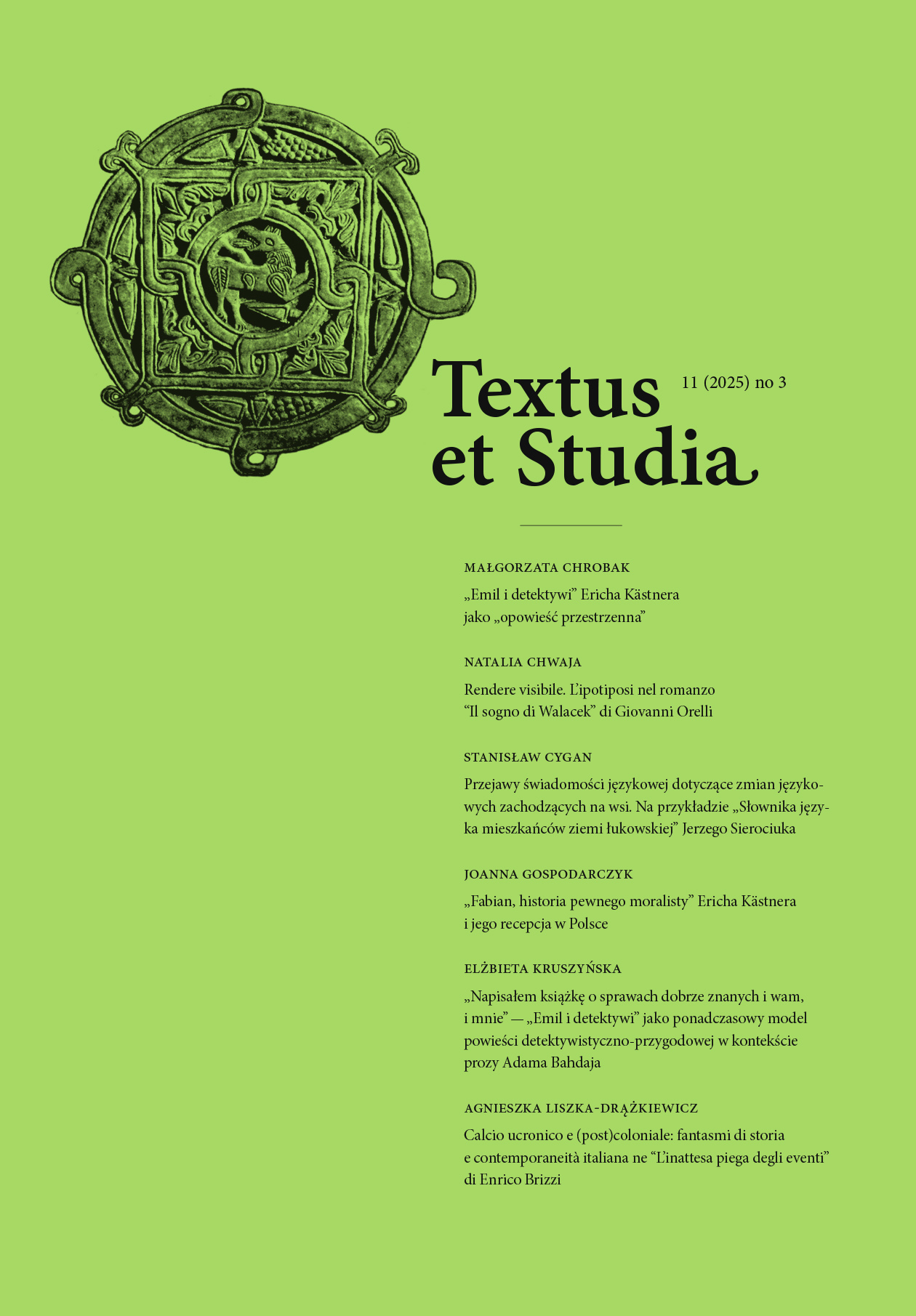The mechanisms of totalitarian power in Erich Kästner’s drama “The school of dictators”
DOI:
https://doi.org/10.15633/tes.11314Keywords:
Erich Kästner, German literature, drama, “The school of dictators", totalitarianism, political powerAbstract
Erich Kästner is mainly known as an author of literature for children and young readers, while his work for an adult audience is less recognisable. The aim of this paper is therefore to introduce the issue of his drama “The school of dictators” (1956), based on Kästner’s experiences of life in the Third Reich. The study focuses on the reception of the play in Poland, its translation and staging, the genesis of the work and the path to its publication on the German market. Particular attention was paid to the analysis of the ways of exercising totalitarian power presented in the drama. Moreover, the fundamental issues of the work were pointed out, such as the abuse of political power, the susceptibility of society to manipulation, and the loss of individual subjectivity. It has been shown that the instruments of power presented in the work, such as public speaking, shaping public opinion and maintaining system stability, are monopolized and stripped of oversight in a dictatorship, leading to the subjugation of the individual to the state.
References
Bankowicz M., Niedemokratyzmy, Kraków 2011.
Budrowska K., Cenzura wobec tematu II wojny światowej w literaturze polskiej w latach 1941–1990. Stan badań i perspektywy badawcze, „Teksty Drugie” 3 (2020), s. 181–197.
Budrowska K., Literatura i pisarze wobec cenzury PRL. 1941–1958, Białystok 2009.
Canetti E., Masa i człowiek, Warszawa 1996.
Enderle L., Erich Kästner, Reinbek bei Hamburg 1990.
Fromm E., Ucieczka od wolności, Warszawa 2007.
Hanuschek S., Keiner blickt dir hinter das Gesicht. Das Leben Erich Kästners, München 2024.
Kästner E., Der Gang vor die Hunde, Zürich 2013.
Kästner E., Ein Mann gibt Auskunft, Zürich 2015.
Kästner E., Kästner über Kästner, w: E. Kästner, Werke, Hrsg. F. J. Görtz, Bd. 2: Wir sind so frei, Chansons, Kabarett, Kleine Prosa, Frankfurt am Main–Wien 1998, s. 326–327.
Kästner E., Szkoła dyktatorów, tłum. Barbara Witek-Swinarska, „Dialog” 9 (1958), s. 61–96.
Kästner E., Trojanische Esel: Theater, Hörspiel, Film, München–Wien 1998.
Kästner E., Über das Verbrennen von Büchern, w: E. Kästner, Splitter und Balken. Publizistik, Wien 1998.
Kucharski K., Irena Rzeszowska nie żyje, 16.01.2001, https://wroclaw.naszemiasto.pl/irena-rzeszowska-nie-zyje/ar/c13-5255571 (10.02.2025).
Nie należy dopuszczać do publikacji. Cenzura w PRL, red. G. Gzella, J. Gzella, Toruń 2013.
Papageien im Gehrock, „Der Spiegel” 05.03.1957, nr 10, https://www.spiegel.de/kultur/papageien-im-gehrock-a-ce37c670-0002-0001-0000-000041120643 (10.02.2025).
Parisi L., Ignazio Silone in exile: Writing and antifascism in Switzerland, 1921–44, „The Modern Language Review” 102 (2007) no. 3, link.gale.com/apps/doc/A166276658/AONE?u=anon~a42753ba&sid=googleScholar&xid=af512661 (18.02.2025).
Reich-Ranicki M., Erich Kästner. Der Dichter der kleinen Freiheit, w: Meine Geschichte der deutschen Literatur. Vom Mittelalter bis zur Gegenwart, Hrsg. T. Anz, München 2014.
Silone I., Die Schule der Diktatoren, Zürich 1938.
Silone I., Szkoła dyktatorów, tłum. G. Herling-Grudziński, „Kultura” (1962) nr 10, s. 1–17, https://staticnowyportal.kulturaparyska.com/attachments/8d/9f/3d7a83d8ddbe786abda721193659d6fa22fb8d21.pdf#page=3 (10.02.2025).
Urban M., Zdanowicz A., Manipulacja polityczna w mediach — mit czy rzeczywistość, „Studia Politologiczne” (2012) nr 25, s. 91–107.
Downloads
Published
Issue
Section
License
Copyright (c) 2025 Dorota Szczęśniak

This work is licensed under a Creative Commons Attribution 4.0 International License.
Authors who publish with this journal agree to the following terms:
- Authors retain the copyright and full publishing rights without restrictions, and grant the journal right of first publication with the work simultaneously licensed under a Creative Commons Attribution 4.0 International License that allows others to share the work with an acknowledgement of the work's authorship and initial publication in this journal.
- Authors are able to enter into separate, additional contractual arrangements for the non-exclusive distribution of the journal's published version of the work (e.g., post it to an institutional repository or publish it in a book), with an acknowledgement of its initial publication in this journal.
- Authors are permitted and encouraged to post their work online (e.g., in institutional repositories or on their website) prior to and during the submission process, as it can lead to productive exchanges, as well as earlier and greater citation of published work (See The Effect of Open Access).

